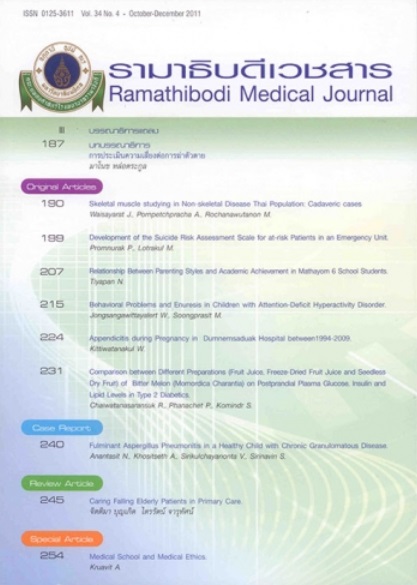Medical School and Medical Ethics
Keywords:
Medical School, Medical EthicsAbstract
Medical ethics and virtues go hand in hand in our everyday practice. Our Thai society has a very high expectation of the medical profession. Therefore, we must instill these beliefs into our medical students even before the start of their careers. It is easy to say that one should be a good doctor, but to really be a good doctor takes a more calculated approach. Stating school may not be all correct; the real teaching starts at home where parents give guidance to their children in their youth, and at schools where teachers impart their beliefs to their students.
All medical school must join together. The Thai medical curriculum should remain up-to-date according to the situation of the country, but it must include the subject of medical ethics. The education about medical ethics must begin on the first day of the medical schooling. The orientation ceremony for medical students each year should repeatedly foster not only the acquisition of medical knowledge, but also the virtues and medical ethics. All the medical teachers, senior colleagues, fellows and residents should also set good examples, role models, of both theory and practice for medical students (What you see is what you get, WYSIWYG). This will reinforce the culture within our medical profession, follow the footsteps of the praiseworthy role models, much like the saying “When in Rome, do what the Romans do” (and in Thai ‘ลูกปูเดินตามแม่ปู่’). The education must regularly emphasize on the practical aspects so that the students may routinely successfully hone their skills, particularly in the ability to appropriately and independently and naturally interact with their patients. Medical students should learn to be givers with grace while in the medical school and for life. Now, without enough money or income, they can start being young givers by losing on penny in treating their patients, whether in despair or not, with love and spiritual care, with generosity and kindness day-by-day. (For someone who has nothing, a little is a lot.)
The aforementioned principles of everyday learning and practice will play a fundamental role in developing strong immunity for all medical students, strengthening our teacher’s hope of having good doctors, experienced doctors, and up-to-date doctors; and furthermore, alleviate the problem of unnecessary lawsuits or complaints once the nurturing of medical professionalism is well-established in all medical schools.
Some of the H.R.H. Prince Mahidol of Songkhla’s philosophical speeches as mentioned in the beginning of this article are eternal not only for Thai doctors, but also for medical doctors from all over the world.
References
Buri P. Nurturing professionalism in medical school. Rama Med J. 2008;31(2):154-62.
The Medical Council of Thailand. The Medical Profession Act B.E. 2525 (1982). 4th ed. Bangkok, Thailand: Ruen Kaew Press; 2001. (in Thai)
Eungprabhanth V. Medical Lawsuit. 1st ed. Bangkok, Thailand: Ruen Kaew Press; 2001. (in Thai)
Boonchalermvipas S. Laws and Precautions of Professional Medical and Nursing Practice. Bangkok, Thailand: Winyuchon Publication House; 2001. (in Thai)
Wasi P. Thai Medical Record. 4th ed. Bangkok, Thailand: Moh-chao-Ban Publishing House; 2009. (in Thai)
Jirapinyo P. Email from a Doctor. 2nd ed. Bangkok, Thailand: Sapphasan Co.,Ltd; 2008. (in Thai)
Sirilai S. Being a Doctor from Hippocrates to Globalization. Bangkok, Thailand: Chulalongkorn University Press; 2009. (in Thai)
Hathirat S. Wise Patients or Stubborn Doctors. 1st ed. Bangkok, Thailand: Moh-chao-Ban Publishing House; 2008. (in Thai)
The Medical Council Committee. Documents for the meeting: The litigation with medical practitioners. Chiang Rai: Wiang Inn Hotel. March 24, 2006. (in Thai)
Gordon LA. Cut to the Chase: 100 Matrix Pearls for Doctors. 1st ed. Nr Shrewsbury, UK: tfm publishing Ltd; 2006.
Putwatana P. Dhamma Department Store. Bangkok, Thailand: Hason Printing; 2009. (in Thai)
Chaipanich T. 3rd Annual Ramathibodi surgical forum: The surgeon was complained. Faculty of Medicine Ramathibodi Hospital Mahidol University; 2006. https://med.mahidol.ac.th/ram/th/TextualArchives/academicandsocialservices-th-1. (in Thai)
Academic Seminar of Professor Jitti Tingsabadh: Euthanasia. 2nd ed. Bangkok, Thailand: Winyuchon Publication House; 2000. (in Thai)
Fongsiripaibul V. Judgment: Physician Imprisonment. The Medical News. 2008;262:16-20. (in Thai)
Wishnitzer R, Laiteerapong T, Hecht O. Subcutaneous implantation of magnets in fingertips of professional gamblers-case report. J Hand Surg Am. 1981;6(5):473-4. doi:10.1016/s0363-5023(81)80107-4.
Kruavit A, Numhom S. Magnet Implantation into a Dice Game Dealers Digital Tips with Late Thumb Tip Infection: An Iatrogenic Criminal Operation. Thai J Surg. 2008;29:97-100. https://www.rcst.or.th/ejournal/files/Vol29_No3_97%20-%20100.pdf.













